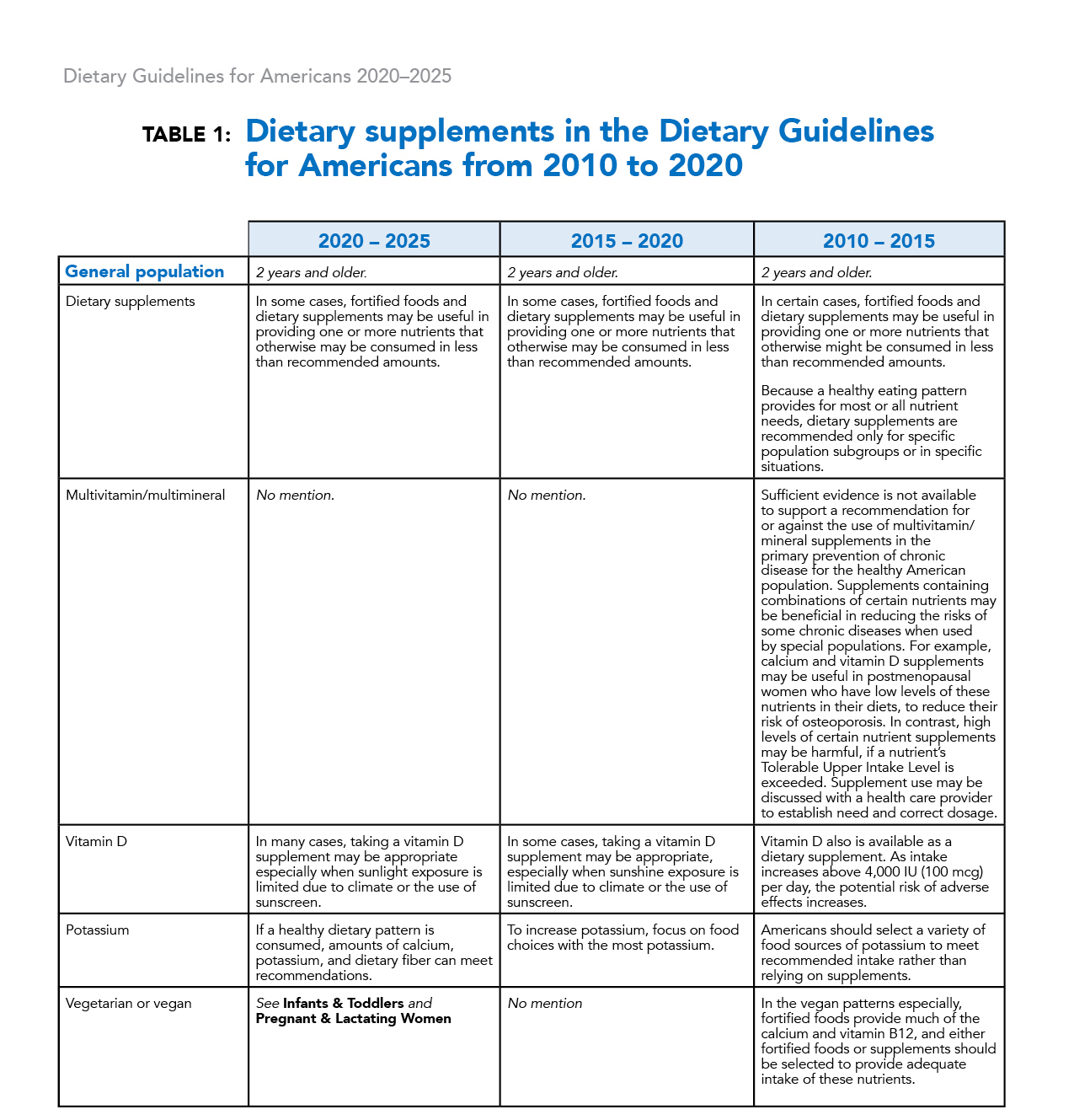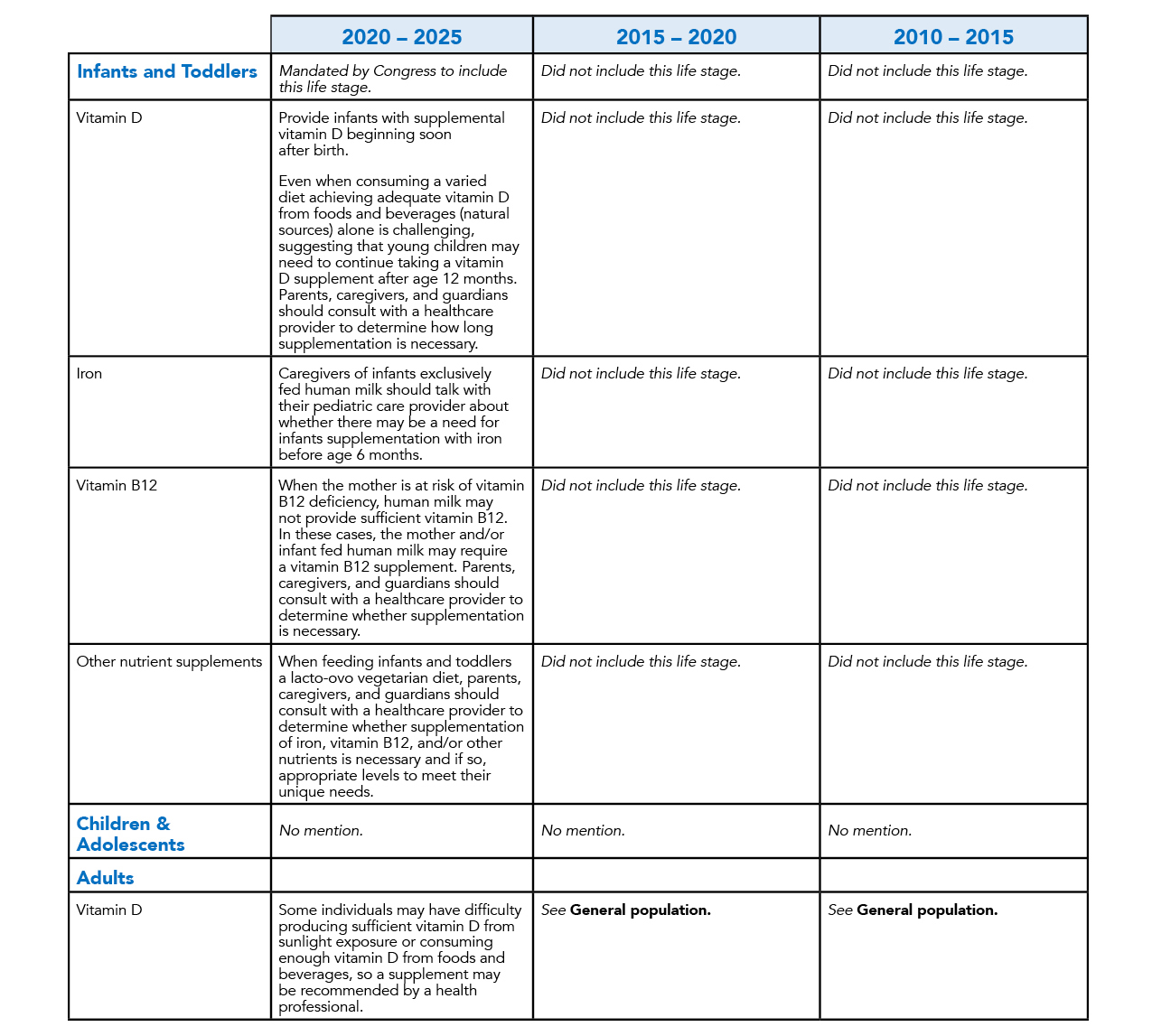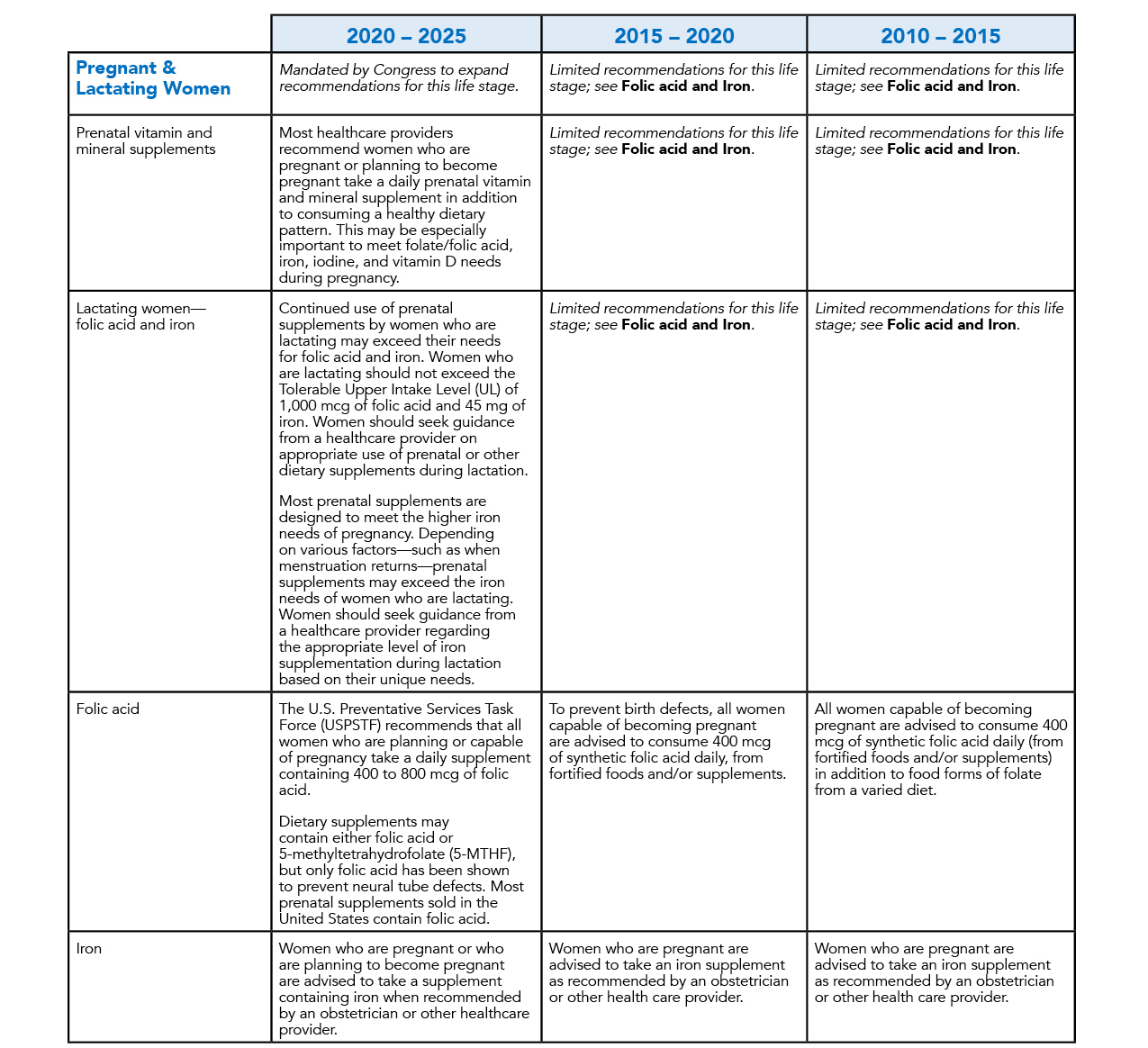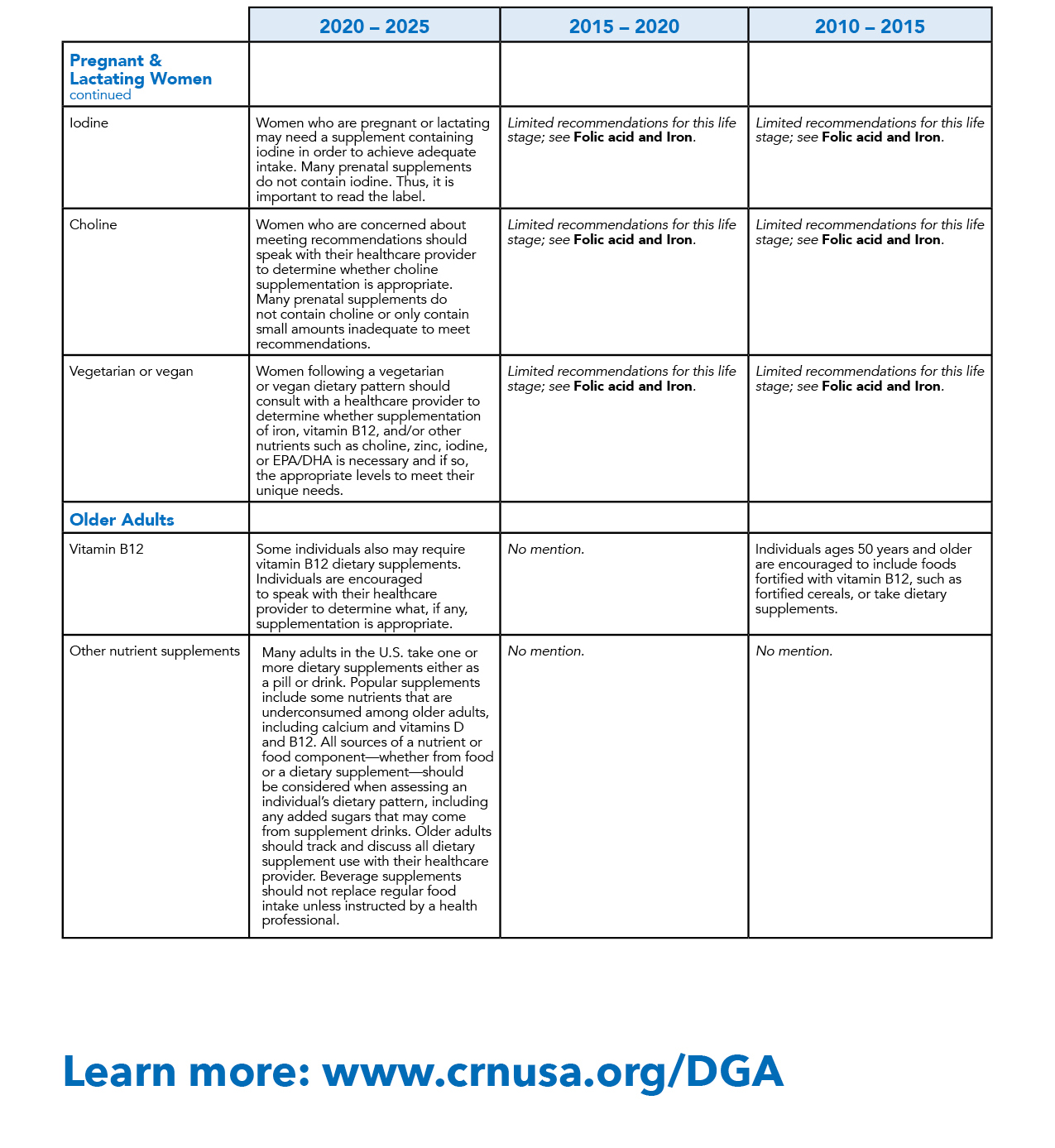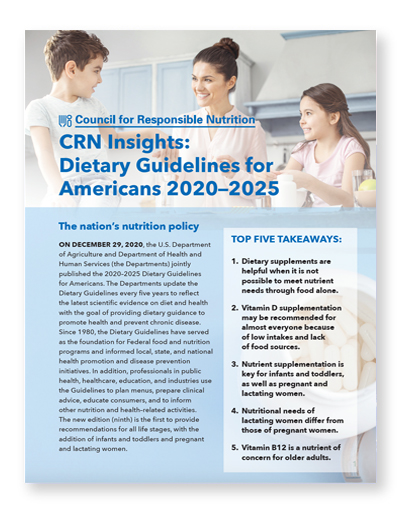 DOWNLOAD PDF | MORE ABOUT THE GUIDELINES
DOWNLOAD PDF | MORE ABOUT THE GUIDELINES
VIDEO: 4 THINGS TO KNOW ABOUT THE DIETARY GUIDELINES FOR AMERICANS
The nation’s nutrition policy
On December 29, 2020, the U.S. Department of Agriculture and Department of Health and Human Services (the Departments) jointly published the 2020–2025 Dietary Guidelines for Americans. The Departments update the Dietary Guidelines every five years to reflect the latest scientific evidence on diet and health with the goal of providing dietary guidance to promote health and prevent chronic disease. Since 1980, the Dietary Guidelines have served as the foundation for Federal food and nutrition programs and informed local, state, and national health promotion and disease prevention initiatives. In addition, professionals in public health, healthcare, education, and industries use the Guidelines to plan menus, prepare clinical advice, educate consumers, and to inform other nutrition and health–related activities. The new edition (ninth) is the first to provide recommendations for all life stages, with the addition of infants and toddlers and pregnant and lactating women.
Informed by advisory committee and public comments—including CRN’s
The modern Dietary Guidelines development process includes a review of current evidence, with opportunity for the public as well as federal agencies to provide comment. The 2020 Dietary Guidelines Advisory Committee comprised 20 experts charged with reviewing the scientific evidence and issuing a report to inform the Departments in developing the 2020–2025 Dietary Guidelines for Americans. CRN provided public and oral comments throughout the Guidelines process, beginning with the selection of review topics, continuing through the deliberations of the Advisory Committee, and culminating in a detailed response to the scientific report. CRN provided the Departments with recommendations, based on the Advisory Committee’s findings, to incorporate into the Dietary Guidelines. See CRN Recommendations for a list of CRN recommendations that appear in the Guidelines in some variation.
The four core guidelines advise individuals to consistently follow a healthy dietary pattern, customize nutrient dense foods, meet food group needs while watching calories, and limit added sugars, saturated fat, sodium, and alcoholic beverages. Healthy dietary patterns include vegetables (all types); fruits, especially whole fruit; grains, at least half of which are whole grain; dairy (fat–free or low fat); protein foods, including lean meats, poultry, and eggs; seafood; beans, peas, and lentils; nuts, seeds, and soy products; and healthy oils. These elements of healthy dietary patterns are consistent for people of all ages regardless of health status.
Identifying key roles for supplements
A fundamental premise of the Dietary Guidelines is that nutritional needs should be met primarily from foods and beverages. However, the Guidelines recognize that dietary supplements (and fortified foods) may be useful in providing one or more nutrients that otherwise may be consumed in less than recommended amounts or that are of particular concern for specific population groups (e.g., pregnant women). Data show that Americans still fall short of meeting recommended intakes for several essential nutrients, including vitamin D, calcium, dietary fiber, and potassium, which are nutrients of public health concern because low intakes are linked to health problems. CRN has engaged in the Dietary Guidelines process for many years to advocate for inclusion of dietary supplements in recommendations.
In the past decade, the Guidelines have gradually increased discussion about dietary supplements and now with the addition of two life stages that clearly have specific nutrient needs that are challenging to meet through food alone, dietary supplements are included in more recommendations. See Table 1 for a comparison of dietary supplement mentions in the past three Guidelines editions).
Looking ahead
With the additional guidance for infants and toddlers and pregnant and lactating women, new questions were raised and more evidence was reviewed about the role of dietary supplements in supporting nutritional needs of these groups. Not every question was answered in this Dietary Guidelines cycle, and more questions may arise, providing opportunity for further discussion about dietary supplements in future Dietary Guidelines for Americans.
The 2020–2025 Dietary Guidelines for Americans and previous editions are available at dietaryguidelines.gov.
CRN Recommendations
CRN advocated for the inclusion of dietary supplement focused recommendations, based on evidence presented in the scientific report of the Dietary Guidelines Advisory Committee. The following recommendations were included in the Dietary Guidelines in some variation. See Table 1 for Dietary Guidelines versions of the recommendations.
- Provide specific guidance on the appropriate use of dietary supplements as a way to meet nutrient needs.
- Emphasize that vitamin D supplementation is necessary for the U.S. population to meet recommended intakes.
- Recommend that vitamin B12 dietary supplements may be considered for older adults due to the inefficient absorption of the nutrient in this age group.
- Reinforce the American Academy of Pediatrics recommendation that infants fed human milk should receive a daily supplement with 400 IU of vitamin D beginning soon after birth.
- Recommend caregivers to speak with a healthcare provider about supplementation to help meet nutrition needs of infants and toddlers.
- Recommend women who are pregnant and lactating to speak to a healthcare provider about using dietary supplements to meet nutrient needs not expected to be covered by food alone.
- Reinforce the previous Guidelines’ recommendation that women who are pregnant are advised to take an iron supplement when recommended by an obstetrician or other health care provider.
- Reinforce the U.S Preventive Services Task Force recommendation that all women who are planning or capable of pregnancy take a daily supplement containing 400 to 800 mcg of folic acid.
- Recommend pregnant and lactating women to consult with a healthcare provider about adequate choline intake and whether choline supplementation is needed.
- Recommend pregnant and lactating women to supplement with 150 mcg iodine per day to achieve adequate intake as this nutrient is critical for growth and development. (Note: The Guidelines state that women who are pregnant or lactating may need a supplement containing iodine in order to achieve adequate intake. There is no mention of a specific supplemental amount).
- Advise lactating women to consult with a healthcare provider about appropriate use of prenatal and other dietary supplements to achieve adequate nutrient intakes, including intake of iron.
Some of CRN’s recommendations were not incorporated in the Guidelines
These recommendations relate to nutrients or food components that are underconsumed, but have not been designated nutrients of public health concern. The Guidelines focused solely on nutrients or food components of public health concern, which are vitamin D, calcium, dietary fiber, and potassium. The following are CRN recommendations that were not included in the Guidelines:
- Recommend Americans to increase intake of underconsumed nutrients: vitamins A, C, D, E, and K, calcium, dietary fiber, potassium, magnesium and choline, especially vitamin D, calcium, dietary fiber, and potassium as these are nutrients of public health concern. (Note: the Guidelines do emphasize increasing intake of nutrients of public health concern).
- List vitamin E and choline as nutrients for which supplementation by the general population may be considered because they are not provided in adequate amounts in the USDA Food Patterns.
- Recommend supplementation to adolescents and teenagers as a way to meet adequacy goals for nutrients and food components with low intakes in this population group: protein, iron, folate, vitamin B6 and B12, phosphorus, magnesium, and choline (as well as nutrients of public health concern).
- Recommend that protein dietary supplements may be considered for older adults because protein is underconsumed in this age group.
- Recommend that pregnant women consult with a healthcare practitioner about omega–3 fatty acid EPA/DHA supplementation to achieve adequacy as intake of seafood is low in this subpopulation.
- Despite not including all of CRN’s recommendations, the 2020–2025 Dietary Guidelines include discussion of dietary supplements more than other guidelines in the past decade. CRN will continue to advocate for recognition of roles for dietary supplements in future editions of the Dietary Guidelines for Americans.
